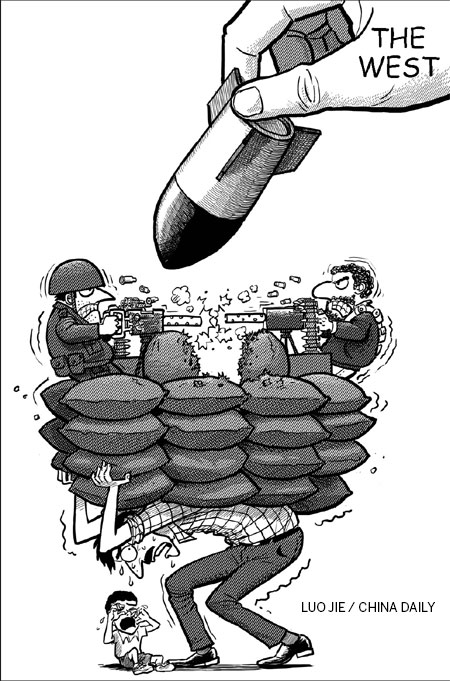Syria another Western power move
Updated: 2012-06-14 08:10
By Li Qingsi (China Daily)
|
||||||||

The volatile Syrian situation is again in the international spotlight after more than 100 people, many of them children, were killed in the town of Houla on May 25, and an unknown number of civilians were killed in Qubair on June 6. After both massacres the United States and some Western countries immediately pinned the blame on the Syrian government before investigations had determined who was responsible.
Why are the US and its Western allies so determined to pin the blame on government forces?
Because, by doing so, they can put pressure on President Bashar al-Assad to step down.
In fact it is the West's support, in terms of diplomacy, international public opinion and weapons, of the Syrian opposition that has led to the prolonged violent unrest in Syria.
Major Western countries are beset with various crises. In order to shift their public's attention from these crises and redirect public resentment, the US and other Western countries continue to create troubles in other countries and regions and are even willing to launch wars.
The former Iraqi and Libyan governments, which always showed disobedience to the West, have been overthrown, now only the Syrian and Iranian governments in the Middle East are left free from the control of the US-dominated Western countries.
To overthrow the disobedient Syrian government is a necessary step for the US to topple the current government in Teheran, and also part of its global strategy to control the world's oil and the US dollar's world currency status.
As former US secretary of state Henry Kissinger once said: control oil and you control nations; control food and you control the people; control currency and you control the world economy.
Controlling the world's oil supplies contributes an important part to the US' world hegemony.
Obviously, the US and its allies do not want to see China and Russia join hands in dealing with the Syrian crisis, as this ruins their dream of controlling the oil in the Middle East. They are trying to alienate China and Russia.
US Secretary of State Hillary Clinton went so far as to claim that Russia and China's position undermines the efforts of international community to pressure the Assad government.
However, China and Russia are committed to upholding the Charter of the United Nations and maintaining peace in the Middle East.
The bloody realities after the Cold War show that Western humanitarian intervention often results in even greater humanitarian crises.
China and Russia are not seeking to maintain the Assad government against the will of the Syrian people. They are respecting the choice of the majority of people in Syria. The West should also respect the choice of the Syrian people. China and Russia's aim is to avoid external armed intervention, which might result in an even greater humanitarian disaster.
If the US and its Western allies insist on the use of force without a UN mandate, the consequences could be disastrous, even for the US.
Kissinger published an article in The Washington Post, "Syrian intervention risks upsetting global order", criticizing the US' rush to intervene in Syria militarily.
Kissinger pointed out military intervention, whether humanitarian or strategic, has two prerequisites. First, a consensus on governance after the overthrow of the status quo is critical. If the objective is confined to deposing a specific ruler, a new civil war could follow in the resulting vacuum, as armed groups contest the succession, and outside countries choose different sides. Second, the political objective must be explicit and achievable in a domestically sustainable time period. He said the US cannot afford to be driven into an undefined military involvement in a conflict taking on an increasingly sectarian character. In the absence of a clearly articulated strategic concept, a world order that erodes borders and merges international and civil wars can never catch its breath.
Of course, his words have been dismissed by hardliners in the US.
For China, the challenges resulting from the Syrian crisis are a test of its diplomatic maturity. As a responsible power, China, in addition to diplomatic mediation, should formulate more practical strategies to respond to Western power practices. After all, it is the West's self-interest that is the root cause of the turmoil in Syria.
The author is a professor at the School of International Studies, Renmin University of China.

 Relief reaches isolated village
Relief reaches isolated village
 Rainfall poses new threats to quake-hit region
Rainfall poses new threats to quake-hit region
 Funerals begin for Boston bombing victims
Funerals begin for Boston bombing victims
 Quake takeaway from China's Air Force
Quake takeaway from China's Air Force
 Obama celebrates young inventors at science fair
Obama celebrates young inventors at science fair
 Earth Day marked around the world
Earth Day marked around the world
 Volunteer team helping students find sense of normalcy
Volunteer team helping students find sense of normalcy
 Ethnic groups quick to join rescue efforts
Ethnic groups quick to join rescue efforts
Most Viewed
Editor's Picks

|

|

|

|

|

|
Today's Top News
Health new priority for quake zone
Xi meets US top military officer
Japan's boats driven out of Diaoyu
China mulls online shopping legislation
Bird flu death toll rises to 22
Putin appoints new ambassador to China
Japanese ships blocked from Diaoyu Islands
Inspired by Guan, more Chinese pick up golf
US Weekly

|

|






